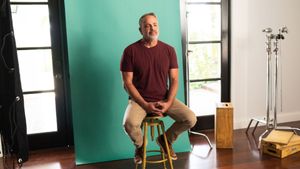OKLAHOMA CITY -- At a candlelight vigil in Oklahoma City on Saturday night, an overflow crowd gathered at a gallery in the 39th Street gay district to mourn the death of Nex Benedict, a teen who died earlier this month following a beating at high school.
The supporters gathered against an orange-gold evening, lighting candles and quietly murmuring to one another as the service began. Most of those attending could not fit into the space used for the service, and lined the street outside beneath multi-colored signs signifying the city’s celebrated lesbian, gay, bisexual and transgender district “gayborhood.”
Related: How you can support queer and trans kids in Oklahoma after Nex Benedict's death
LBGTQ+ supporters and activists called for action, the event darkened not only by the death of the Owasso teen, but also by recent inflammatory comments from a state government official calling the state’s LBGTQ+ citizens “filth.”
Nicole Poindexter, an associate regional campaign director of the state’s Human Rights Campaign, recounted to the crowd how she had lobbied against recent anti-LGBTQ+ bills at the state legislature, which has passed laws that restrict LBGTQ+ language in schools and bar transgender students from using bathrooms that align with their gender identity.
“We told them this would happen,” Poindexter said. “We told them that if they continued this rhetoric of hate, this rhetoric of division, that it would result in body bags, and I am devastated to tell you we were right.”
Poindexter called for the removal of State Superintendent of Schools Ryan Walters, who told the New York Times after Benedict’s death, “There’s not multiple genders. There’s two. That’s how God created us.”
The crowd roared, cheering Poindexter’s statement.
Among those standing outside, the statements in the service echoed eerily, and seemed to bounce from one candle-lit face to another as many watched the livestream on their smartphones. The crowd included city and state officials, drag queens, activists, ministers, and supportive city residents.
“I’ve been doing activism in the state since 2010 as a sister,” said Sister Ishtar, an activist with the pro-LBGTQ+ Sisters of the Sacred Heartland. “I tell you what’s great about today, is I see a lot of people I’ve never seen out at one of these. Obviously this has struck a chord with the community and that’s very encouraging.”
 Sunny Stevens, Hannah Sloan, and Zachary Henry have their memorial candles lit by LBGTQ+ activist Bitch Puddin’ during a vigil in Oklahoma City for Nex Benedict, a bullied teen who died after a beating in the town of Owasso.Ben Fenwick
Sunny Stevens, Hannah Sloan, and Zachary Henry have their memorial candles lit by LBGTQ+ activist Bitch Puddin’ during a vigil in Oklahoma City for Nex Benedict, a bullied teen who died after a beating in the town of Owasso.Ben Fenwick
Ward 2 City Council representative James Cooper, the city’s first openly gay council member who was elected in 2019, said the comments by state officials are causing incidents such as those that led to the death of Nex. Cooper referred to recent comments by State Senator Tom Woods, who, commenting on Nex’s death, said “We are a religious state and we are going to fight it to keep that filth out of the state of Oklahoma because we are a Christian state – we are a moral state.”
“When we have officials at any level of government who refer to lesbian, gay, transgender, or queer people as ‘filth,’ calling them out of their name as a human being, and saying they and their constituents do not want ‘filth’ in our state and that ‘we will fight it,’ we must never be surprised when everyday people take up that word ‘fight’ and fight people in public for just being LBGTQ,” Cooper said. “That language is from a belief system where people have a backward interpretation of their sacred text.”
Cooper said he was haunted by the death of Nex, saying, “It could have been me. I lost count of the number of times in middle school, high school, grade school, when groups in the hallways made similar threats. I can only be thankful that they didn’t carry it out,” he said. “Often it was because I ran, or I had the right cheerleader or the right jock talk them out of it. Oh, this could have been me.”
Cooper’s comments echoed those of Bitch Puddin’, another activist who attended the service in drag. Puddin recounted how, when attending a rural high school, “If I wasn’t a bigger kid in high school, this could have been me.”
At Nex’s age of 16, Puddin was a high school linebacker in the southeastern Oklahoma town of Antlers, the seat of Pushmataha County in a region known as “Little Dixie.”
“If I wasn’t in football in high school and able to ‘pass,’ it could have been me,” Puddin said. “Even though I was a big kid in high school, and closeted, I was still scared.”


 Sunny Stevens, Hannah Sloan, and Zachary Henry have their memorial candles lit by LBGTQ+ activist Bitch Puddin’ during a vigil in Oklahoma City for Nex Benedict, a bullied teen who died after a beating in the town of Owasso.Ben Fenwick
Sunny Stevens, Hannah Sloan, and Zachary Henry have their memorial candles lit by LBGTQ+ activist Bitch Puddin’ during a vigil in Oklahoma City for Nex Benedict, a bullied teen who died after a beating in the town of Owasso.Ben Fenwick
















































































